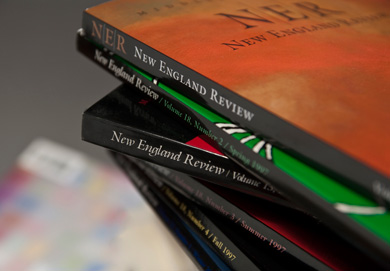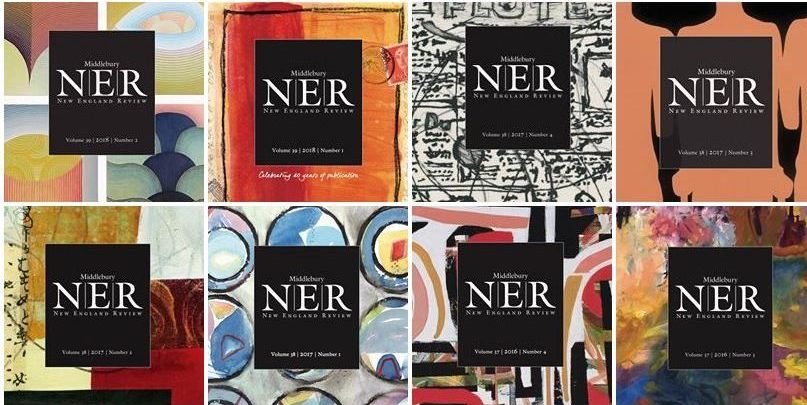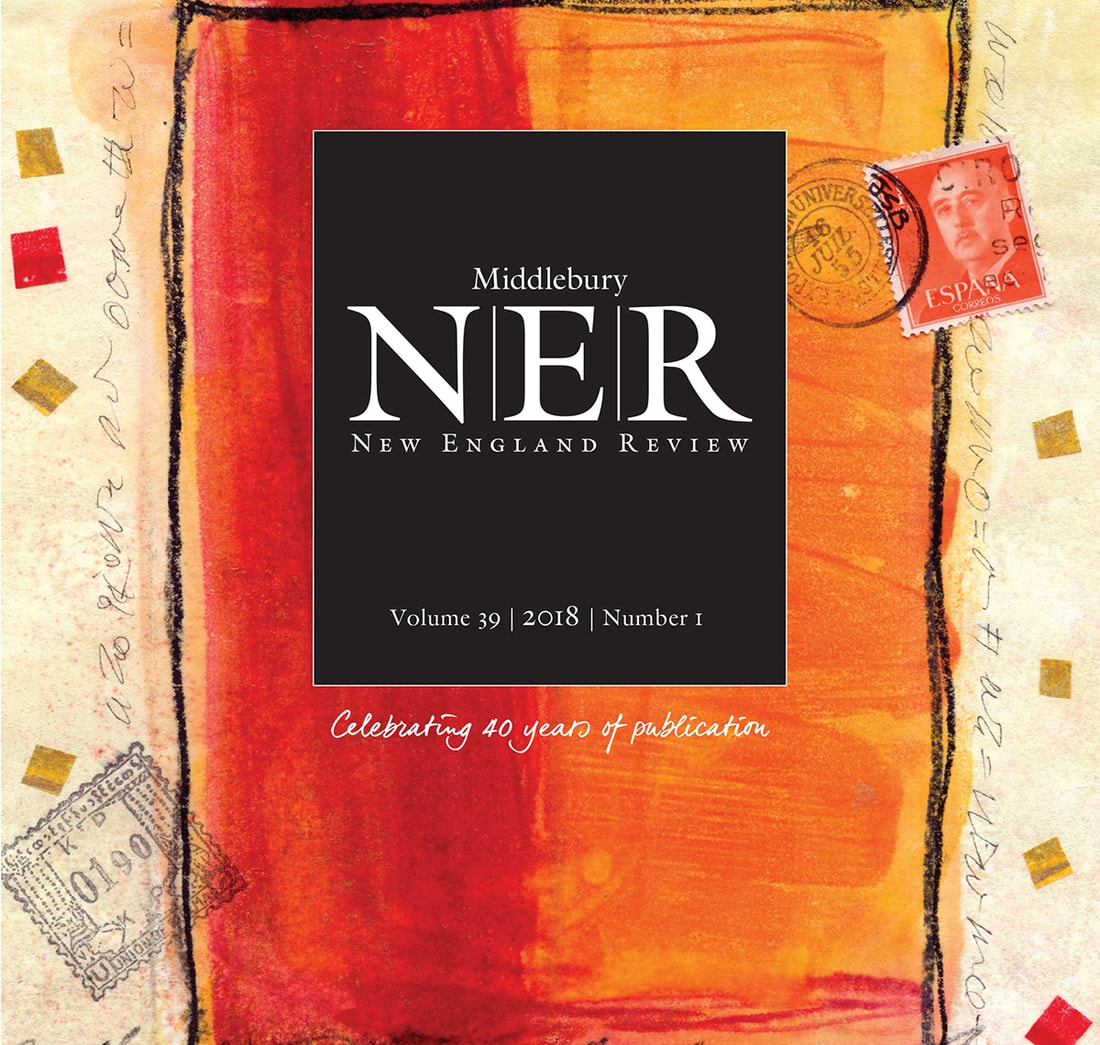- Folio No. 9
- About
- Feral Parrot : The Blog
- INTERVIEWS
- SUBMISSIONS
-
ISSUE ARCHIVE
- PRINT Chapbook No.6 Healing Arts
- Online Issue No.9
- Online Issue No.1 Fall 2016
- Online Issue No.2 Spring 2017
- ONLINE Issue No.3 Fall 2017
- PRINT Vol 72 No 2 Fall 2017
- PRINT Vol 73 No.1 Fall 2018
- ONLINE Issue No. 4 Fall 2018
- Online Issue No.5 Summer 2018
- FOLIO No.1 Fall 2018 VOTE
- ONLINE Issue No.6 Fall 2018 Fall Spirituality
- FOLIO 2 Fall 2019 Celebrating Dia De Los Muertos
- FOLIO No.3 -- Moon Moon Spring 2019
- FOLIO No.4 Celebrating New PCC Writers
- FOLIO No.5 City of Redemption
- FOLIO No.6 Spring 2020
- FOLIO No. 7 - Winter 2021 Into the Forest
- 2022 Handley Awards
- Inscape Alumni Board
- PRINT Chapbook No. 7 Healing Arts
- Blog
- Untitled
Written by Evan KrikorianThe literary magazine New England Review is a quarterly-based publication produced by Middlebury College, located in Vermont. First established in 1978, it has been a prominent magazine of literature, looking to highlight authors that present original voices to its works. To further its want of “unusual and compelling” pieces, they have established the opportunity for a full scholarship towards the Bread Loaf Writers’ Conference, a conference regarded by many, such as The New Yorker, as “the oldest and most prestigious” in the country. The New England Review publishes creative works such as poetry, fiction, and nonfiction, as well as critical and investigational pieces. The branding of the magazine is focused more so towards formality with an overtone of introspective eccentricism, as its need for new and refreshing tones is slightly bogged down by the decorum of the magazine’s presentation itself. As seen on many physical issues, the front cover introduces colorful elements that pop out at the reader and invoke curiosity, yet the same sort of intrigue loses its grasp on the ordinary-styled and simple internal page layouts - trying to be innovative in whatever slight sense while still being a literary journal is a hard line to balance. Though they do not publish separate issues online, ebook editions of some of its yearly releases and a catalog of former issues are available for sale, with each piece within the issues being indexed alongside the magazine’s cover artwork. As part of its newsletter, the publication has an email page where stories, poems, and other online-exclusive works are available to view on occasion. On its print-releases, the New England Review seems dedicated to giving each work a proper, clean presentation, and attempts to not add too much flourish, seen in the structure of works such as Arseny Tarkovsky’s “Ignatevsky Forest”. The aesthetic of the magazine seems enveloped with the works in which it publishes: a polished and refined message that seems to carefully approach creative themes. In its pressing but reserved trimming, the cover art attempts to deliver a message of safe resound, such that its first impression can be received as proper yet explorative. In published poems such as Matthew Nienow’s “It’s the Boat That Haunts You,” or Beverly Burch’s “A Brief History of Rejection,” both featured within 2012’s first quarterly issue, the voices that each carry symbolize a thematic representation of change, reflective of the seemingly familiar issues present to many readers alike. Nienow’s poetry speaks of growth in a physical representation of change, echoed in lines such as “May you forget your life, may you / always be close” as well as / And so it is, the boat has come to own you”, which details a sort of personal grievance shaken by time itself. In Burch’s work, emphasis is carried upon a duality of history and mistakes, with phrases like “Rejection slips emerged in the next century” highlighting past regret. Rather than be traditional in the somewhat-traditionally formatted magazine, both poems carry an air of brevity through figurative language and in framing its individual paradigms, such that the emotions both express complex and delicate, rather than one-sided or bland. In the journal’s other published creative works, especially in the genres of fiction and non-fiction, the format remains largely the same. The content is appealing and framed in a way to appeal to the design or outlook of the New England Review itself, allowing room for calculated error, but little deviation from that due to needing to maintain a professional image.  Photo by Michael Alexander Chaney Photo by Michael Alexander Chaney The New England Review shows its history on its well-trimmed spine, priding itself on the success it formed from its past. In attempting to continue that pursuit of fame, of which it already has earned through its numerous critically-acclaimed reviews, they characterize themselves seriously in wanting unique works - even though they want to pick out selections that are seemingly new, they are unfortunately limiting themselves in scope due to the simple fact that they are a literary journal. For what they aim to have done though in their use of branding and reputation, they are successful, and Pasadena City College’s Inscape magazine might very well be able to recruit some of New England Review’s formality. Evan Krikorian serves as Inscape's lead archivist. An optimistic student in wanting to transfer to Cal State Long Beach. He says, " I aspire to be an English teacher and wish to cultivate an understanding of personal expression for my students."
0 Comments
Leave a Reply. |
IMPORTANT NOTE:
PCC Inscape Magazine, housed at Pasadena City College, is following Coronavirus protocols. At this time our staff continues to read submissions and publish web content. Note:
Blog Posts reflect the opinions of the writer and not the opinions of Pasadena City College or Inscape Magazine Editorial Staff Members. Archives
December 2023
Categories
All
|




 RSS Feed
RSS Feed